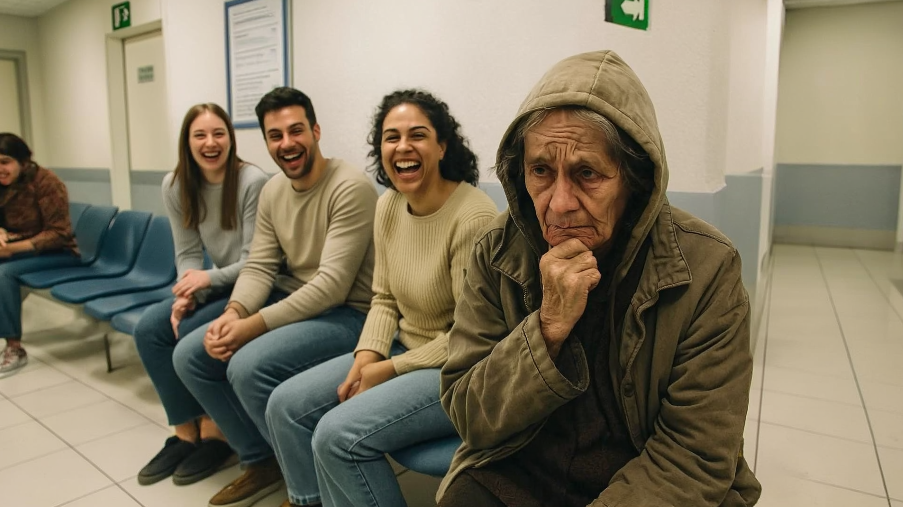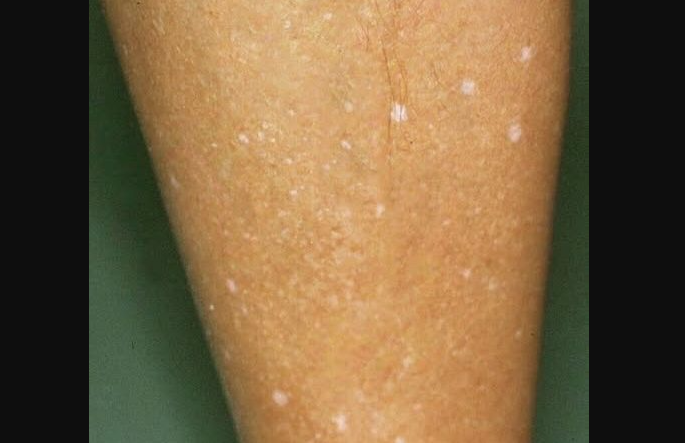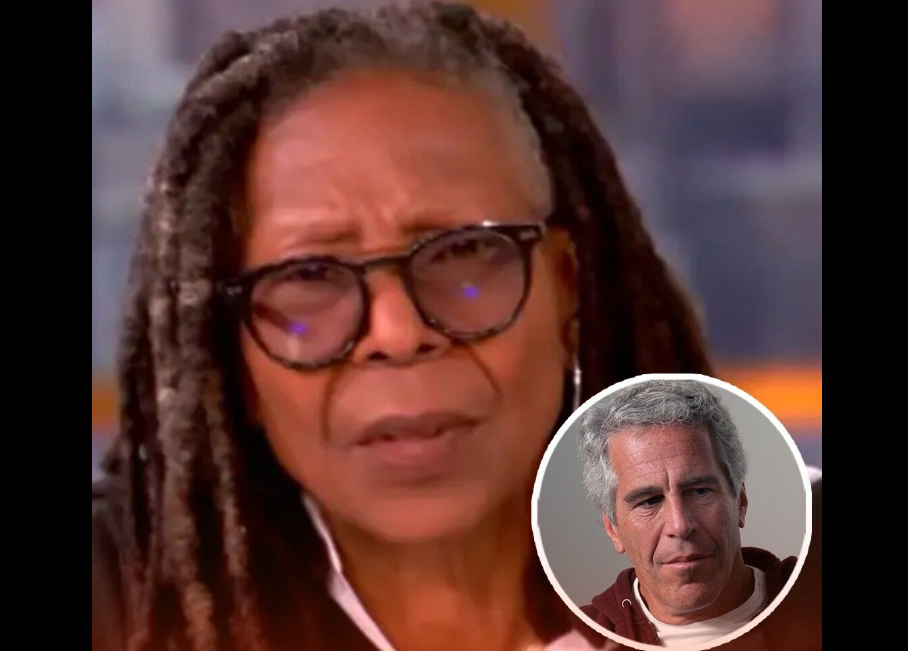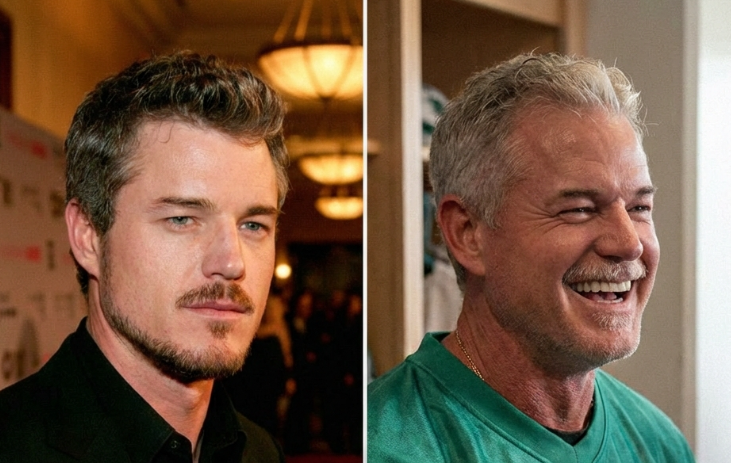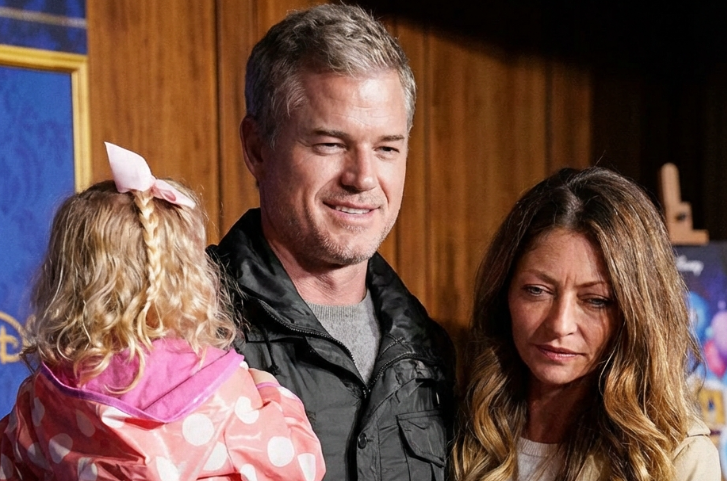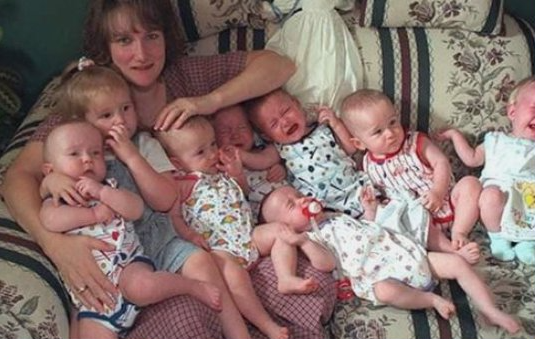She sat quietly near the corner, clutching a tattered purse in her lap.
Her coat was far too thin for the weather, her shoes scuffed and mismatched.
The hospital waiting room was full, and most people gave her a wide berth — out of judgment, and some out of discomfort.
One woman leaned over to her husband and whispered, “She must be lost.
She probably wandered in from the street.”
He chuckled.
“She’s waiting for free coffee, not a patient.”
A group of well-dressed family members glanced at her, rolled their eyes, and laughed under their breath every time she shifted or reached into her bag.
One nurse even gently asked, “Ma’am, are you sure you’re in the right place?”
“Yes, dear,” she said softly.
“I’m exactly where I need to be.”
An hour passed.
Then two.
Still, she waited.
Finally, the double doors swung open and a man in full surgical gear walked out, scanning the room.
He looked exhausted — mask down, hair messy from the scrub cap — and headed directly toward the old woman.
Everyone stared.
He stopped in front of her, eyes softening.
Then he said, loud enough for the whole room to hear:
“Are you ready to tell them who you are now?”
The room went still.
The woman lifted her head slowly, blinking up at him.
Her lips trembled slightly, but there was a steady quality in her gaze.
“I suppose it’s time,” she murmured.
The surgeon reached down, taking her hand with surprising tenderness.
She stood, her back a little crooked, but her steps sure.
All the people who had mocked her moments ago now stared in stunned silence.
The nurse who had questioned her earlier looked away, flustered.
The surgeon turned to the crowd, clearing his throat.
“This woman,” he said, “is the reason I’m standing here today.”
Gasps scattered through the room.
“My name is Dr. Sebastian Creighton.
I completed a fourteen-hour surgery.
A triple bypass on a man who would have died without it.
The reason I could perform that — the reason I became a surgeon — is because of her.”
He nodded toward the woman, who now stood with quiet pride in her eyes.
“Her name is Margaret.
She is not an ordinary old lady.
She is the woman who raised me when no one else would.
She worked two cleaning jobs to pay for my school supplies.
She skipped meals so I could eat.
When I told her I wanted to be a doctor, she said, ‘Then be the best doctor you can.’”
Margaret’s eyes shimmered, but she didn’t cry.
“I never knew my real parents,” Dr. Creighton continued.
“I was placed at a shelter when I was three.
Margaret volunteered there part-time.
She looked at me and said, ‘I believe this one is mine now.’”
The room had fallen completely silent.
“She adopted me with no money, no help.
Only heart.
Today she waited five hours here because I requested to see her after my surgery.
Not for an emergency.
Simply to hug her.
Because I promised I’d always make time for the woman who never gave up on me.”
He turned and pulled her into a long, quiet embrace.
His shoulders visibly trembled.
Someone in the waiting room began to clap.
Then another.
Soon, the entire room stood, applauding.
Margaret looked around, confused.
“Why are they clapping?” she whispered to him.
“Because, Mom,” he smiled, “you deserve recognition.”
After the moment passed and the room settled, Margaret sat back down beside him.
The nurse who had earlier doubted her brought her a warm cup of tea, her hands shaking slightly.
“I’m very sorry, ma’am,” she said.
Margaret simply smiled.
“That’s alright, dear.
Sometimes people only perceive what is superficial.
I have done it too.”
She sipped her tea, her hands still trembling slightly from age.
One of the women who had mocked her earlier approached cautiously.
She looked embarrassed, her designer bag clutched awkwardly to her chest.
“I didn’t know,” she mumbled.
“I assumed… well…”
“It’s alright,” Margaret said again.
“We all make assumptions.”
But the surgeon glanced at her.
“That does not make it right.”
The woman nodded, her cheeks reddening.
“No, it does not.”
Margaret leaned back, resting her head against the wall, and smiled.
“It’s humorous, you know.
Throughout my life, people overlooked me.
Never truly saw me.
It never truly bothered me.
But today, being recognized by you?
That was everything.”
Dr. Creighton reached over and gently squeezed her hand.
He called for a hospital staffer and arranged for a private car to take Margaret home.
“And ensure someone delivers hot meals to her residence for the next week.
She will claim she does not require it, but disregard her,” he added with a grin.
She playfully swatted his arm.
“I can still cook, you know.”
“Yes, but you should not have to anymore.”
As the staff moved to carry out his instructions, Margaret finally turned to him with a quiet sigh.
“You did not have to do all that,” she said.
“I know,” he replied.
“But I wanted the world to know who raised me.”
By the time she left, several other patients had quietly thanked her.
One woman whispered that she reminded her of her own mother, who passed away too soon.
A man in his sixties said he hoped someone would speak that kindly of him someday.
Margaret nodded politely to each of them, overwhelmed but gracious.
But that was not the end.
A week later, someone who had been in the waiting room posted the story online.
No names.
Only the moment.
The surgeon.
The woman.
The lesson.
It gained widespread attention almost instantly.
People everywhere began sharing it, contacting their mothers, apologizing for past judgments.
Donations flowed into local shelters.
Volunteers registered to mentor children.
Some even inquired how to locate Margaret, simply to express their gratitude.
Dr. Creighton never confirmed or denied the story.
However, he did post one thing on his account.
A photo of Margaret in her tiny kitchen, holding a tray of cookies, smiling proudly.
Captioned: “You raised me with crumbs and kindness.
Now the world witnesses the abundance you bestowed.”
Margaret did not hold much regard for the internet.
She still did not possess a smartphone.
But when she learned people were exhibiting greater kindness toward strangers because of her story, she shook her head and laughed.
“All that from merely waiting in a chair,” she said.
However, she understood it was more than that.
For the next time she visited the hospital, circumstances had changed.
People greeted her with warmth.
Nurses brought her tea without prompting.
Someone had even left a knitted blanket on her customary seat in the waiting room.
And when a young mother appeared overwhelmed with her toddler, Margaret knelt and diverted the child with a gentle smile and a toy from her bag.
The mother looked up with grateful tears in her eyes.
“Thank you.”
Margaret simply nodded.
“We are all waiting for something, dear.
It is worthwhile to make the wait easier for another.”
In time, Margaret’s story became a legend at the hospital.
New interns heard it during orientation.
Patients inquired about “the lady from the story.”
Staff who had once walked past her without acknowledgment now paused to converse, to sit with her, to listen.
She never desired attention.
She never sought praise.
But ultimately, she received something superior — respect.
And when she passed away quietly in her sleep two years later, the hospital held a small memorial.
The surgeon spoke, as did a few nurses.
The most touching words came from a janitor who stated:
“She used to remain after her appointments solely to assist me in mopping spills.
She claimed it reminded her of former times.
She imparted that every task holds significance if it benefits someone.”
They placed a plaque in the waiting room where she used to sit.
It simply read:
“In Loving Memory of Margaret — Who Waited With Grace, And Taught Us To See.”
And occasionally, a new person would inquire, “Who was Margaret?”
And another would smile and respond, “Allow me to recount a story.”
Because sometimes, the quietest individuals leave the most profound echoes.
Therefore, the next time you encounter someone who appears out of place, refrain from hasty judgment.
They might be precisely where they need to be — and they might have already transformed someone’s life.
If this story touched you, take a moment to share it.
Offer a like, tag someone who would appreciate it, or simply extend a gesture of kindness today.
